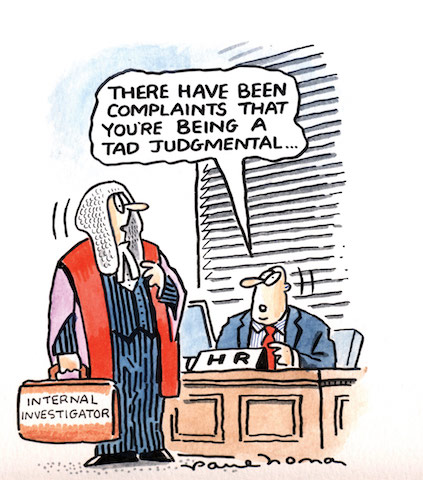How to run a proper investigation
Have you been asked to investigate a colleague’s conduct or performance? Here are ten tips for avoiding costly and career-damaging pitfalls.
Many people don’t realise how pressurised, difficult and time consuming investigations can be. Consider carefully whether you’re right for the job. Are you impartial? Do you have any prior involvement? Do you have the experience? Are you senior enough? What support will you get from HR? Consider the impact on your day job – investigations can drag on for months or even years, especially if you end up in front of an Employment Tribunal or the GMC. Are you prepared for that?
Make sure you get rock solid terms of reference. It needs to be crystal clear what’s being investigated, who’s involved and how the investigation will be conducted. If the terms of reference are vague or inaccurate, insist on rewriting them yourself or seek advice on doing so. It’s better to walk away than risk your professional reputation running what will inevitably be a sub-standard investigation.
Don’t confuse your role with that of the disciplining officer. You’re not there to prove the employer’s case, but to make a neutral and impartial assessment of the facts. Remember, the accused person’s union reps and/or lawyers will try to undermine your credibility as an investigator, so don’t make it easy for them!
Verify all the basic facts about the case. For example, if someone is accused of not doing part of their job, check their job description to see if they’re really responsible for doing it. Make sure you have accurate contact details for everyone involved. I’ve seen a number of investigations and investigators derailed because confidential details were sent to the wrong person.
Is the evidence credible? Is there any substance to the allegations? Check the records – is there evidence of a pattern of behaviour? And don’t ask leading questions. I once defended a member falsely accused of sleeping on shift. Instead of asking if anyone had actually seen the member sleeping, the investigator asked witnesses if they were aware he was sleeping. That will get you a hammering from any trade union official or barrister worth their salt.
Your job is not to dig up dirt, or show that the person under investigation is a bad employee. Stick to the specific allegations in your terms of reference; you have to show evidence of solid reasons for any deviation from them. Remember, you cannot make a smoking gun – if the evidence isn’t there, there’s no case to answer.
Employers often suspend senior managers as a panic response to any accusations. Although it’s supposed to be neutral, suspension invariably feels punitive to the person suspended, and makes it almost impossible for a senior manager to return to work even if they are subsequently exonerated. So it’s in both their and the organisation’s interests to use it only as a last resort. Think about redeployment to another post or site instead.
The employee’s trade union rep will press you hard on both the evidence and the way you conduct your investigation. Remember, this is never personal – they would do the same on your behalf if the boot was on the other foot. Prepare to be grilled very hard by a barrister if you go before a tribunal or the GMC. And if you’re criticised in the ruling, it could be on the web for ever and a day.
Employers have a duty of care towards people being investigated. There’s nothing worse than sitting at home for months on end, not knowing what’s going on. Make sure someone from management is contacting them at least once every two weeks, keep everyone informed on progress and stay in regular touch with the union rep dealing with the case – they want a fair investigation too!
Related News
-

Tipster: How to do your own quarterly review
Executive coach Jane Galloway explains how taking time to reflect on your last quarter can set you up for a brilliant next three months.
-

Tipster: How to manage in a crisis
Leadership coach and former senior detective Andy Cribbin offers his tips for managers on how to prepare for a crisis, manage calmly and deliver results that people will remember.
-

Tipster: How to restart you career after redundancy
Being made redundant or looking for work in later life can be an unsettling experience. Lucy Standing, co-founder of older workers support network Brave Starts, gives her tips on how to explore your options and boost your chances of finding the job you want.